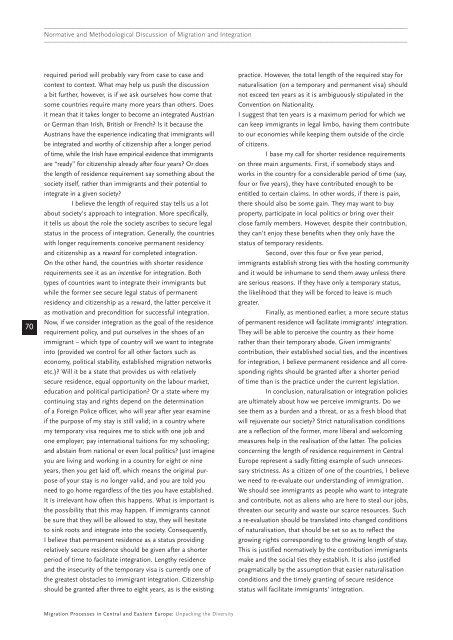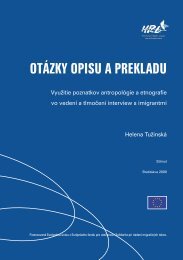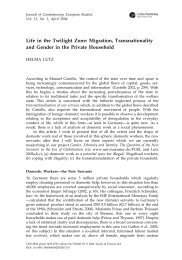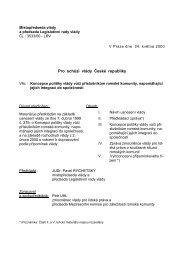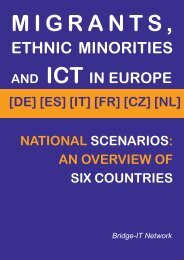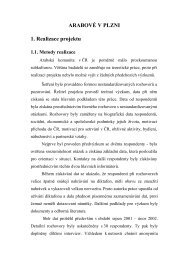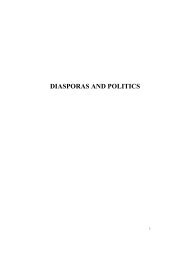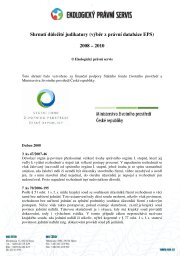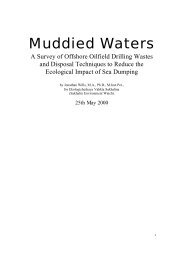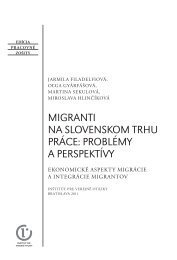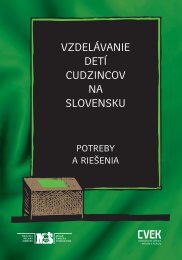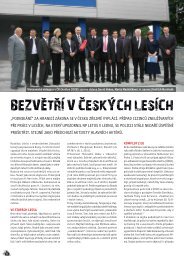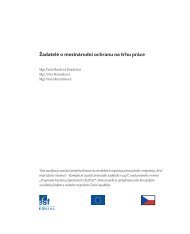Migration Processes in Central and Eastern Europe - Multiple Choices
Migration Processes in Central and Eastern Europe - Multiple Choices
Migration Processes in Central and Eastern Europe - Multiple Choices
You also want an ePaper? Increase the reach of your titles
YUMPU automatically turns print PDFs into web optimized ePapers that Google loves.
———————————————————————————————————————————————————————————————<br />
Normative <strong>and</strong> Methodological Discussion of <strong>Migration</strong> <strong>and</strong> Integration<br />
———————————————————————————————————————————————————————————————<br />
70<br />
required period will probably vary from case to case <strong>and</strong><br />
context to context. What may help us push the discussion<br />
a bit further, however, is if we ask ourselves how come that<br />
some countries require many more years than others. Does<br />
it mean that it takes longer to become an <strong>in</strong>tegrated Austrian<br />
or German than Irish, British or French? Is it because the<br />
Austrians have the experience <strong>in</strong>dicat<strong>in</strong>g that immigrants will<br />
be <strong>in</strong>tegrated <strong>and</strong> worthy of citizenship after a longer period<br />
of time, while the Irish have empirical evidence that immigrants<br />
are “ready” for citizenship already after four years? Or does<br />
the length of residence requirement say someth<strong>in</strong>g about the<br />
society itself, rather than immigrants <strong>and</strong> their potential to<br />
<strong>in</strong>tegrate <strong>in</strong> a given society?<br />
I believe the length of required stay tells us a lot<br />
about society's approach to <strong>in</strong>tegration. More specifically,<br />
it tells us about the role the society ascribes to secure legal<br />
status <strong>in</strong> the process of <strong>in</strong>tegration. Generally, the countries<br />
with longer requirements conceive permanent residency<br />
<strong>and</strong> citizenship as a reward for completed <strong>in</strong>tegration.<br />
On the other h<strong>and</strong>, the countries with shorter residence<br />
requirements see it as an <strong>in</strong>centive for <strong>in</strong>tegration. Both<br />
types of countries want to <strong>in</strong>tegrate their immigrants but<br />
while the former see secure legal status of permanent<br />
residency <strong>and</strong> citizenship as a reward, the latter perceive it<br />
as motivation <strong>and</strong> precondition for successful <strong>in</strong>tegration.<br />
Now, if we consider <strong>in</strong>tegration as the goal of the residence<br />
requirement policy, <strong>and</strong> put ourselves <strong>in</strong> the shoes of an<br />
immigrant – which type of country will we want to <strong>in</strong>tegrate<br />
<strong>in</strong>to (provided we control for all other factors such as<br />
economy, political stability, established migration networks<br />
etc.)? Will it be a state that provides us with relatively<br />
secure residence, equal opportunity on the labour market,<br />
education <strong>and</strong> political participation? Or a state where my<br />
cont<strong>in</strong>u<strong>in</strong>g stay <strong>and</strong> rights depend on the determ<strong>in</strong>ation<br />
of a Foreign Police officer, who will year after year exam<strong>in</strong>e<br />
if the purpose of my stay is still valid; <strong>in</strong> a country where<br />
my temporary visa requires me to stick with one job <strong>and</strong><br />
one employer; pay <strong>in</strong>ternational tuitions for my school<strong>in</strong>g;<br />
<strong>and</strong> absta<strong>in</strong> from national or even local politics? Just imag<strong>in</strong>e<br />
you are liv<strong>in</strong>g <strong>and</strong> work<strong>in</strong>g <strong>in</strong> a country for eight or n<strong>in</strong>e<br />
years, then you get laid off, which means the orig<strong>in</strong>al purpose<br />
of your stay is no longer valid, <strong>and</strong> you are told you<br />
need to go home regardless of the ties you have established.<br />
It is irrelevant how often this happens. What is important is<br />
the possibility that this may happen. If immigrants cannot<br />
be sure that they will be allowed to stay, they will hesitate<br />
to s<strong>in</strong>k roots <strong>and</strong> <strong>in</strong>tegrate <strong>in</strong>to the society. Consequently,<br />
I believe that permanent residence as a status provid<strong>in</strong>g<br />
relatively secure residence should be given after a shorter<br />
period of time to facilitate <strong>in</strong>tegration. Lengthy residence<br />
<strong>and</strong> the <strong>in</strong>security of the temporary visa is currently one of<br />
the greatest obstacles to immigrant <strong>in</strong>tegration. Citizenship<br />
should be granted after three to eight years, as is the exist<strong>in</strong>g<br />
practice. However, the total length of the required stay for<br />
naturalisation (on a temporary <strong>and</strong> permanent visa) should<br />
not exceed ten years as it is ambiguously stipulated <strong>in</strong> the<br />
Convention on Nationality.<br />
I suggest that ten years is a maximum period for which we<br />
can keep immigrants <strong>in</strong> legal limbo, hav<strong>in</strong>g them contribute<br />
to our economies while keep<strong>in</strong>g them outside of the circle<br />
of citizens.<br />
I base my call for shorter residence requirements<br />
on three ma<strong>in</strong> arguments. First, if somebody stays <strong>and</strong><br />
works <strong>in</strong> the country for a considerable period of time (say,<br />
four or five years), they have contributed enough to be<br />
entitled to certa<strong>in</strong> claims. In other words, if there is pa<strong>in</strong>,<br />
there should also be some ga<strong>in</strong>. They may want to buy<br />
property, participate <strong>in</strong> local politics or br<strong>in</strong>g over their<br />
close family members. However, despite their contribution,<br />
they can't enjoy these benefits when they only have the<br />
status of temporary residents.<br />
Second, over this four or five year period,<br />
immigrants establish strong ties with the host<strong>in</strong>g community<br />
<strong>and</strong> it would be <strong>in</strong>humane to send them away unless there<br />
are serious reasons. If they have only a temporary status,<br />
the likelihood that they will be forced to leave is much<br />
greater.<br />
F<strong>in</strong>ally, as mentioned earlier, a more secure status<br />
of permanent residence will facilitate immigrants' <strong>in</strong>tegration.<br />
They will be able to perceive the country as their home<br />
rather than their temporary abode. Given immigrants'<br />
contribution, their established social ties, <strong>and</strong> the <strong>in</strong>centives<br />
for <strong>in</strong>tegration, I believe permanent residence <strong>and</strong> all correspond<strong>in</strong>g<br />
rights should be granted after a shorter period<br />
of time than is the practice under the current legislation.<br />
In conclusion, naturalisation or <strong>in</strong>tegration policies<br />
are ultimately about how we perceive immigrants. Do we<br />
see them as a burden <strong>and</strong> a threat, or as a fresh blood that<br />
will rejuvenate our society? Strict naturalisation conditions<br />
are a reflection of the former, more liberal <strong>and</strong> welcom<strong>in</strong>g<br />
measures help <strong>in</strong> the realisation of the latter. The policies<br />
concern<strong>in</strong>g the length of residence requirement <strong>in</strong> <strong>Central</strong><br />
<strong>Europe</strong> represent a sadly fitt<strong>in</strong>g example of such unnecessary<br />
strictness. As a citizen of one of the countries, I believe<br />
we need to re-evaluate our underst<strong>and</strong><strong>in</strong>g of immigration.<br />
We should see immigrants as people who want to <strong>in</strong>tegrate<br />
<strong>and</strong> contribute, not as aliens who are here to steal our jobs,<br />
threaten our security <strong>and</strong> waste our scarce resources. Such<br />
a re-evaluation should be translated <strong>in</strong>to changed conditions<br />
of naturalisation, that should be set so as to reflect the<br />
grow<strong>in</strong>g rights correspond<strong>in</strong>g to the grow<strong>in</strong>g length of stay.<br />
This is justified normatively by the contribution immigrants<br />
make <strong>and</strong> the social ties they establish. It is also justified<br />
pragmatically by the assumption that easier naturalisation<br />
conditions <strong>and</strong> the timely grant<strong>in</strong>g of secure residence<br />
status will facilitate immigrants' <strong>in</strong>tegration.<br />
<strong>Migration</strong> <strong>Processes</strong> <strong>in</strong> <strong>Central</strong> <strong>and</strong> <strong>Eastern</strong> <strong>Europe</strong>: Unpack<strong>in</strong>g the Diversity


